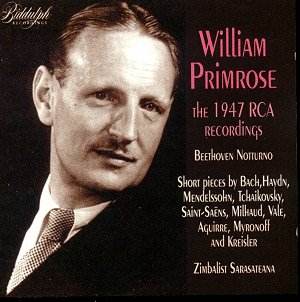AVAILABILITY
www.biddulphrecordings.com
Biddulph is back. The label’s relaunch is good
news for all admirers of string playing and also of piano and
orchestral music in which areas the company is building a fine
catalogue. The renewed availability of this Primrose disc brings
a valuable slice of his immediate post-War recordings into the
public domain in cogent and effective ways. What’s remarkable
is that all the sides here were recorded on a single day, 17 December
1947 – though some remained unissued on 78 they all appeared on
7" 45 rpm discs. Some of these sides are tricky to collect
especially as not many received British releases, so their collation
here is a boon for admirers of the great Glasgow-born violist.
These discs reveal Primrose in all his technical
and expressive glory. The range of tone colours he brings out
is phenomenal, the left hand performing feats of digital dexterity
sufficient to depress even the toughest professional, and the
bow arm capable of seductive slowness or biting incision. There
are plenty of sweetmeats here and rumbustious tropical fare (courtesy
of Milhaud, Vale and Aguirre) and dextrous finger busting fireworks
in the form of the Zimbalist. But there is also the Bach – clean,
no portamenti, a sustained bronzed legato – and the Piatigorsky
arranged Haydn in which his upper string playing sings out with
crystalline purity and the finale of which is dispatched with
marvellously articulated left hand work. The Notturno, with which
he took some textual liberties, shows the handsome range of tone
colours he could elicit and his Mendelssohn dances joyously.
His Andante Cantabile is taken at a good flowing
tempo and features some discreet echt Romantic slides before he
unleashes his Kreisler; infectious brio and style informs Schön
Rosmarin and Liebesleid is rhythmically right inside the genre
(Primrose had been an eloquent Kreisler playing back in his violin
playing days). He played his friend Myronoff’s Caprice from the
score – quirky, slightly mordant with some excellent work from
pianist David Stimer, the violist’s first class accompanist. His
Milhaud is decisive and swaying and one listens spellbound to
the subtle variations in vibrato usage, the supercharged pizzicati
and salty, knowing phrasing. Tully Potter’s notes relate that
he wanted to scrap his recording of Zimbalist’s confection but,
thankfully, was dissuaded. Years later he acknowledged it had
turned out all right – and no wonder. This is scintillating playing,
virtuosic and theatrical and brilliantly dashing.
The transfers are vital and lifelike; no over-cleaning
sounds to have been used so there’s some inevitable surface noise
but Primrose’s tone emerges naturally and without hindrance. A
splendid salute: assuming that he made two takes of everything
that’s two and a half hours in the can on one day - some stamina,
some playing.
Jonathan Woolf

